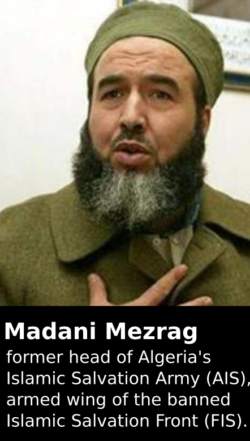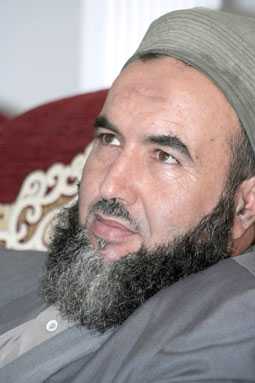The suicide bombings that took place in Algeria on 6 and 9 September, one of which targeted the motorcade of President Abdul-Aziz Bouteflika, renewed talk of a hidden struggle within the Algerian regime, known for having multiple centres of decision-making. There is the possibility that the bombings are connected with President Bouteflika's policies and ambitions to secure a third presidential term, which would require amending the Algerian constitution, which currently allows only two terms. The Algerian people approved this constitutional formulation in 1996, three years before Bouteflika assumed office.
Interpretations have gone as far as considering the terrorist bombings a clear message from the Algerian authorities and the army leadership. This message is read as a rejection of the president's policies of widening the scope of national reconciliation that he commenced. A civil harmony law was issued in 1999, which offered amnesty to members of the Islamic Salvation Army. The militia is affiliated with the Islamic Salvation Front (FIS), which won the 1991 parliamentary elections before the election process was halted and the country entered a spiral of violence. This was followed by the national reconciliation and harmony law of 2005, which allowed many members of different militias located in the Algerian mountains to descend from their highland posts. The law granted them presidential amnesty for the crimes they had committed, except for those proved to have been involved in the massacres that took place in Algeria in 1995-97.
The suicide bombings took place at the beginning of September, directly following a campaign of rumours about the health of President Bouteflika. No one doubts that he is suffering from health problems, and everyone knows that he was rushed to Val-de-Grace Hospital in Paris last year, where he underwent surgery. The office of the Algerian presidency said at the time that the operation was related to a stomach ulcer, while unofficial sources indicated that it was related to the removal of a cancerous tumor.
Rumours concerning the health status and even death of Bouteflika were repeated throughout August. The president was forced to send his prime minister, Abdul-Aziz Belkhadem, to confront the media in a press conference that was almost entirely devoted to the topic of the president's health, during which Belkhadem denied claims that the health of the republic's president was deteriorating. This was followed by an official television appearance by Bouteflika during his visit to the family of Major General Ismail Al-Amari, head of the counter-intelligence agency.
As a response to these rumours, Bouteflika scheduled field visits to five governorates in eastern Algeria. In his last stop, a suicide bombing took place only 10 minutes prior to the scheduled arrival of his motorcade. While crowds were awaiting his arrival, 22 were killed and 100 injured. This bombing was followed by another with a mined vehicle that targeted a coast guard barracks which killed 35 coast guards and injured 60.
If indeed this is an internal struggle, the only centres that are obvious are the republic's presidential office, which has taken on a more personal character since Bouteflika assumed the post of president, and the centre of the hard core of the army leadership, which opposes Bouteflika's ideas and regrets that it brought him to power in 1999.
Although the Al-Qaeda organisation in Islamic North Africa has claimed responsibility for the two suicide bombings, the interpretation of a struggle taking place between wings within the ruling power remains strong. There is no support for the statements made by the top official in the Algerian security agencies, Colonel Ali Tunisi, in a private interview with three Algerian newspapers last Sunday. He denied the presence of Al-Qaeda in Algeria and said that there is no basis of truth for the claim of the Algerian terrorist Salafi Organisation for Preaching and Fighting (SOPF) that it falls under the banner of Al-Qaeda. On the contrary, he introduced a new factor to the analysis by mentioning that the security agencies were not sure who was behind the suicide bombings. This casts doubt on the SOPF's claim that it perpetrated the bombings on behalf of Bin Laden's organisation.
In light of this observation and the conflicting analyses, the most important news regarding the consequences of the bombings earlier this month was not in Algerian newspapers but on an Internet website that appears to be related to a newspaper that the Algerian authorities suspended three months ago, and whose owner has been imprisoned for two years. The site provided news on the convening of a Supreme Security Council meeting for the first time since 1991, when it met following the first round of parliamentary elections that resulted in a major advance for the Islamic Salvation Front. At that time, the Supreme Security Council decided to halt the election process and dismiss the president, Chadli Bendjedid.
The sources of this website said the meeting included President Bouteflika and leader of the armed forces, Lieutenant General Qayid Saleh, chief of staff of the Algerian army, Lieutenant General Mohamed Madin, head of the Algerian intelligence agency, Prime Minister Belkhadem, and Minister of the Interior Yezid Zerhouni.
The convening of a Supreme Security Council meeting, a body provided for by the Algerian constitution but which is held only under exceptional circumstances, is considered an indication of a crisis at the highest levels of authority. The sources of this website state that the meeting was devoted to study the deteriorating security situation and ways of dealing with it, and yet analysis and guesswork soon led to the belief that the matter was in fact related to clarifying relations between the president of the republic and other decision-making centres in the Algerian regime. The meeting was also believed to have been held to seek an agreement on points of difference in order to prevent the repetition of the scenarios played out in the country in the past due to struggles within the regime. Such scenarios began with the cancellation of the 1991 elections and the consequences of that move, including violence that lasted more than 15 years, the assassination of president Mohamed Boudiaf in 1992, and president Liamine Zeroual having to resign in 1998.
It remains unclear what the outcome of this private meeting was, and whether President Bouteflika wants to increase his powers and secure the right to a third term -- the sore point between the president and the military. During an extended term, Bouteflika said he wants to prepare his successor to follow his approach, and this does not please some of the army leadership that have grown accustomed to direct interference in the selection of Algeria's presidents. These army leaders were prepared to work with Bouteflika until the end of his current term or the next one, or even until he was unable to continue his mission due to his health status, but they will not accept him choosing the person who will succeed him if that person does not agree with their views concerning the running of the country's affairs. |
 [ENGLISH.ALARABIYA.NET] Algeria on Monday ordered the closure of a private television station after it broadcast an interview with an Islamist figure accused of "subversive" remarks, the communications ministry said.
[ENGLISH.ALARABIYA.NET] Algeria on Monday ordered the closure of a private television station after it broadcast an interview with an Islamist figure accused of "subversive" remarks, the communications ministry said.
 President Bouteflika has addressed a letter to console Mustapha Kartali after being seriously injured in a murder attempt last week, former
President Bouteflika has addressed a letter to console Mustapha Kartali after being seriously injured in a murder attempt last week, former 
 Algerian troops killed one of North Africa's most-wanted terrorist leaders, who allied his group with Usama bin Laden's Al Qaeda network, the military said Sunday.
Algerian troops killed one of North Africa's most-wanted terrorist leaders, who allied his group with Usama bin Laden's Al Qaeda network, the military said Sunday.